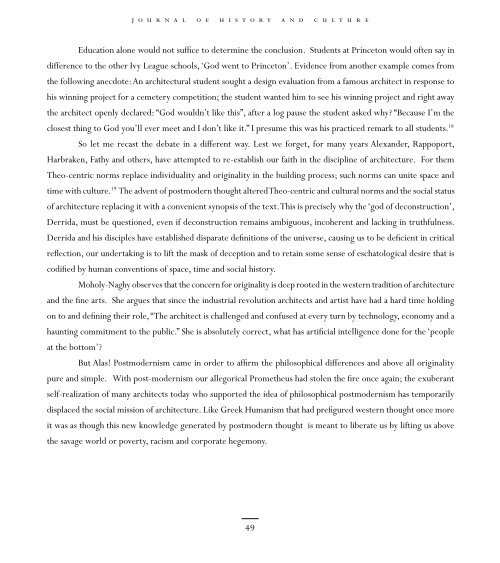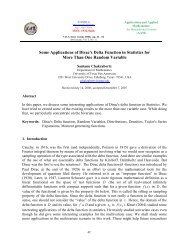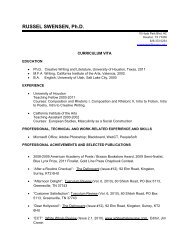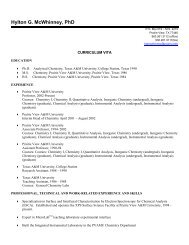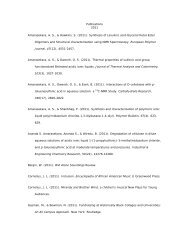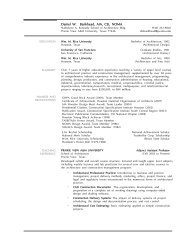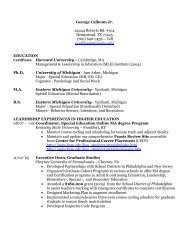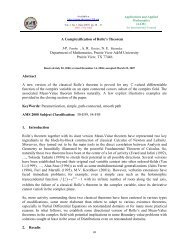Journal of History and Culture Journal of History and Culture
Journal of History and Culture Journal of History and Culture
Journal of History and Culture Journal of History and Culture
Create successful ePaper yourself
Turn your PDF publications into a flip-book with our unique Google optimized e-Paper software.
j o u r n a l o f h i s t o r y a n d c u l t u r e<br />
Education alone would not suffice to determine the conclusion. Students at Princeton would <strong>of</strong>ten say in<br />
difference to the other Ivy League schools, ‘God went to Princeton’. Evidence from another example comes from<br />
the following anecdote: An architectural student sought a design evaluation from a famous architect in response to<br />
his winning project for a cemetery competition; the student wanted him to see his winning project <strong>and</strong> right away<br />
the architect openly declared: “God wouldn’t like this”, after a log pause the student asked why? “Because I’m the<br />
closest thing to God you’ll ever meet <strong>and</strong> I don’t like it.” I presume this was his practiced remark to all students. 18<br />
So let me recast the debate in a different way. Lest we forget, for many years Alex<strong>and</strong>er, Rappoport,<br />
Harbraken, Fathy <strong>and</strong> others, have attempted to re-establish our faith in the discipline <strong>of</strong> architecture. For them<br />
Theo-centric norms replace individuality <strong>and</strong> originality in the building process; such norms can unite space <strong>and</strong><br />
time with culture. 19 The advent <strong>of</strong> postmodern thought altered Theo-centric <strong>and</strong> cultural norms <strong>and</strong> the social status<br />
<strong>of</strong> architecture replacing it with a convenient synopsis <strong>of</strong> the text. This is precisely why the ‘god <strong>of</strong> deconstruction’,<br />
Derrida, must be questioned, even if deconstruction remains ambiguous, incoherent <strong>and</strong> lacking in truthfulness.<br />
Derrida <strong>and</strong> his disciples have established disparate definitions <strong>of</strong> the universe, causing us to be deficient in critical<br />
reflection, our undertaking is to lift the mask <strong>of</strong> deception <strong>and</strong> to retain some sense <strong>of</strong> eschatological desire that is<br />
codified by human conventions <strong>of</strong> space, time <strong>and</strong> social history.<br />
Moholy-Naghy observes that the concern for originality is deep rooted in the western tradition <strong>of</strong> architecture<br />
<strong>and</strong> the fine arts. She argues that since the industrial revolution architects <strong>and</strong> artist have had a hard time holding<br />
on to <strong>and</strong> defining their role, “The architect is challenged <strong>and</strong> confused at every turn by technology, economy <strong>and</strong> a<br />
haunting commitment to the public.” She is absolutely correct, what has artificial intelligence done for the ‘people<br />
at the bottom’?<br />
But Alas! Postmodernism came in order to affirm the philosophical differences <strong>and</strong> above all originality<br />
pure <strong>and</strong> simple. With post-modernism our allegorical Prometheus had stolen the fire once again; the exuberant<br />
self-realization <strong>of</strong> many architects today who supported the idea <strong>of</strong> philosophical postmodernism has temporarily<br />
displaced the social mission <strong>of</strong> architecture. Like Greek Humanism that had prefigured western thought once more<br />
it was as though this new knowledge generated by postmodern thought is meant to liberate us by lifting us above<br />
the savage world or poverty, racism <strong>and</strong> corporate hegemony.<br />
49


